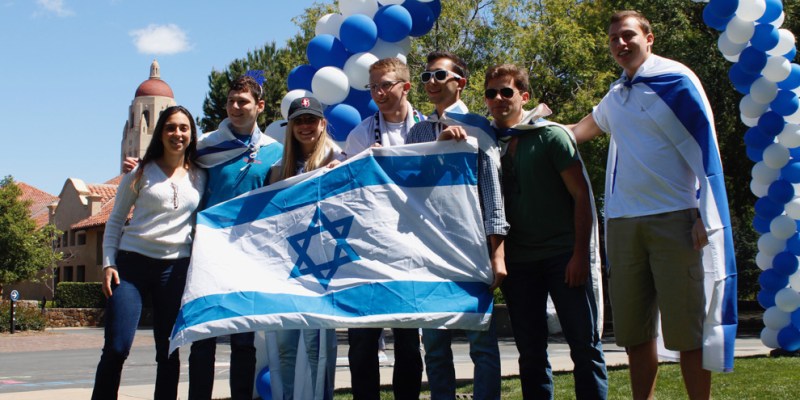The Stanford Israel Association (SIA) hosted an event celebrating Yom Ha’atzmaut — or Israel Independence Day — on Thursday at White Plaza. The Yom Ha’atzmaut celebration was part of the ongoing Israel Week, a week of programming that celebrates Israeli and Jewish culture and educates people on the region’s issues.
According to SIA President Avi Kaye ’21, the celebration of Israel’s 70th anniversary of independence was meant to bring the community together to celebrate a “vibrant” nation.
“It’s no secret that Jews have been one of the most oppressed groups in history, and the fact that we finally have a state to call ours, a place that we can call home, that to us is a big deal,” said David Lerner ’20, former president of SIA.
Meanwhile, on the pavement right next to White Plaza, Students for Justice in Palestine (SJP) and Jewish Voices for Peace (JVP) staged a demonstration. This week is also Palestine Awareness Week, organized by SJP, JVP and the International Socialist Organization (ISO).
According to JVP Co-President Emily Wilder ’20, the purpose of their week-long programming is to celebrate Palestinian culture and “educate people on the realities of the Palestinian struggle.”
“We are commemorating the day of the Nakba, the day of the ethnic cleansing of more than 750,000 Palestinians from their homeland,” Wilder said.
The week has highlighted campus conversations about the Israel-Palestine conflict.
“I can’t with good conscience as a Jewish person stand here while they celebrate a Jewish identity that feels foreign to me,” said Esther Tsvayg ’20, a co-president of JVP.
Members of all the groups involved in both the celebration and the protest said that they were willing to engage in dialogue with the other side.
“Conversation around Israel is very sensitive,” Kaye said. “It’s a very complicated issue. If we don’t actually come together to have conversations, we can’t make action and change.”
“We definitely are open to discourse,” Wilder stated. “That’s why we’re doing these educational events. We just find that a critical conversation that really scrutinizes Israel is so lacking on campus, and that’s why we’re attempting to occupy this space, to basically allow for that conversation.”
However, members on both sides admitted that discourse can be difficult. SJP and JVP worry that conversations about Israel and Palestine too often occur on an uneven playing field where Israel has more power than Palestine.
“I don’t think people come to the table with equal power dynamics,” said Jennifer Perry, a member of JVP and SJP. “I think that is really important to pay attention to.”
“We find ourselves needing to sort of occupy these informal spaces as SJP and JVP because we’re not invited into Hillel institutionally,” Wilder said.
While individual members of the SJP and JVP are welcome at Hillel — Stanford’s hub for Jewish student life — according to Wilder, the groups as a whole are not allowed to hold meetings in Hillel on their own.
This is due to SJP’s and JVP’s support of the Boycott, Divestment, Sanctions (BDS) movement, a global campaign that promotes boycotting Israel to “pressure Israel to comply with international law,” according to the movement’s website.
“Groups that affiliate with Hillel need to not support BDS as a strategy,” said Rabbi Jessica Kirschner, the executive director of Hillel. “Our goal is to be a home for Jewish students on campus, and if we weren’t able to hold that standard, I think there are a lot of people in our community that would say that [Hillel] is not the place for me.”
Members of SIA said they feel mischaracterized in conversations about Israel.
“We’re not evil,” Lerner said. “We’re just people who are proud to have a state.”
“We want to have conversations if both sides … can agree that Israel has the right to exist as a Jewish state … and that we both want peace and both people to live side by side together,” Reyes said.
Students involved have concrete visions of what that future should look like.
“I want whatever solution will lead to full equality for Palestinians,” Tsvayg said. “Whatever route that needs to be taken for that demand to be met — that’s the one I’m invested in.”
“Our hope is for all the people to live together in the land, to coexist, to both live in the land with peace,” said Kaye.
Correction: a previous version of this article incorrectly stated that this year was Israel’s 17th birthday, not its 70th. The Stanford Daily regrets the error.
Contact Adesuwa Agbonile at adesuwaa ‘at’ stanford.edu.
